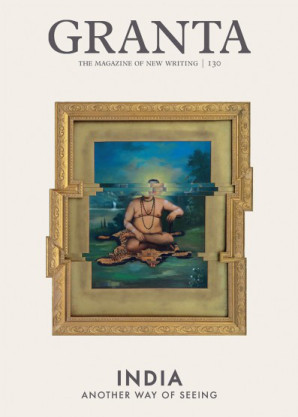The following is an short excerpt from the non-fiction piece by Aman Sethi entitled ‘Love Jihad’, published in the Winter 2015 edition of Granta Magazine. Aman Sethi writes:
 Cover of Granta Issue 130 (Source: Granta)
Cover of Granta Issue 130 (Source: Granta)
Vijaykant Chauhan was born to a family of Punjabi artisans who crossed over from Rawalpindi in Pakistan to settle in a refugee camp in Saharanpur. In Rawalpindi, his grandfather had made ghungroo, tiny metallic ankle bells worn by subcontinental dancers, and in Saharanpur, his father learned the craft and set up a small business.
In his telling, Chauhan’s father was an impoverished and occasionally violent man, and so young Vijaykant spent a lot of time with his grandparents, particularly his maternal gradmother.
‘My nani told me stories about the partition, and how entire neighbourhoods butchered each other. When the mob came for my nani, she squeezed herself under a pile of fresh corpses that lay in the local vegetable market. That is how she escaped.’
Vijaykant claims he was an extraordinary student – ‘I was perfect’ – but was forced out of school in grade seven on an administrative technicality.
‘My parents tried to reason with the school, but what did they have? No connections, no money – and so my father put me to work at the shop.’
Vijaykant hated it. He escaped to religious functions organized by the RSS and joined the Bajrang Dal, a particularly violent RSS affiliate implicated in everything from attacking young unmarried couples for holding hands to organizing riots and building bombs.
The RSS and its many affiliates work on what a friend of mine once called the ‘life insurance model’: the RSS puts out a policy – it could be an agitation against cow slaughter, or the need for a new temple in the place of an old mosque – and leaves it to individual agents to take the initiative, spread the word and find followers who buy into the policy.
_ ‘I don’t have a school degree, my family has no resources, but God has made me for a special purpose.’
‘I began my career as a particularly aggressive enforcer for the RSS,’ Chauhan said. ‘When the Bajrang Dal demanded that the markets close in solidarity with their causes, I made sure all shops downed their shutters immediately.’ On the side, he did odd jobs; he worked briefly as an electrician and he helped out at his father’s shop. Still, there was always a tiny voice that said, ‘I don’t have a school degree, my family has no resources, but God has made me for a special purpose.’
In 2004, that purpose was made manifest. Rashid Masood, an influential politician from Saharanpur, publicly declared that he would not say ‘Vande mataram’, as saying a prayer to a deity like Bharat Mata was against his religion.
Chauhan was incensed. Bharat Mata, or Mother India, is the personification of the Indian nation as a female, saree-clad, Hindu deity. She made one of her earliest appearances in Anandamath, an 1882 novel by Bankimchandra Chattopadhyay, in which a group of Hindu sages rise up against Muslim overlords loyal to the British Empire.
Chauhan is obsessed with Bharat Mata – she is a frequent subject of his WhatsApp messages. ‘Vande Mataram’, or ‘Hail Thee Mother’, a poem from Ananandamath, was a rallying cry for the independence movement and is accorded the status of India’s ‘national song’, separate from the national anthem. Chauhan has ‘Vande Mataram’ tattooed on his chest, arms and back.
The morning after Masood’s refusal, Chauhan launched Mission Vande Mataram – the aim of which was to get as many people to say ‘Vande Mataram’ as often as possible.
The following year, Chauhan organized a cultural programme to commemmorate his Vande Mataram movement. When the programme sponsors pulled out at the last minute, he sold his house to pay for the arrangements.
_ ‘Thousands of people came up to me to thank me for reminding them of their sacred duties as patriots. I asked myself, why do I need a house? Why do I need a job? All I need is two rotis a day, which God shall provide. I decided to devote myself to the nation.’
‘The programme was a super-duper success. We did a play about Bhagat Singh’s sacrifices to the nation,’ he said. ‘Thousands of people came up to me to thank me for reminding them of their sacred duties as patriots. I asked myself, why do I need a house? Why do I need a job? All I need is two rotis a day, which God shall provide. I decided to devote myself to the nation.’
These days, Chauhan lives in a large open cow shelter in Saharanpur. He sleeps on a string cot and spends his time looking after stray cattle and fighting Love Jihad.
End excerpt. Read the full piece online.
Of course we should denounce unequivocally and prosecute criminally the “very specific attacks – on families, on people’s bodies, on communities, on individual rights” that the rise of the Right has set off in recent times, as author and activist Naomi Klein has argued. Nonetheless, we must remember that this in no way disqualifies us from asking the Žižekian question – why do large sections of the Indian population today crave a kind of passionate political action? Perhaps it is only the form of passion which is being served that varies: (a) the spectacle of dynamic administration (of executive decision making) for select sections of the population, (b) the chance to act out continuing frustrations through communal participation in caste-ist/religious fervour for others? Can we read the rise of the Right as symptomatic of a deeper malaise? Can we ask the question – what remains hidden, obscured by the (today) omnipresent ‘irrational’, caste-ist/religious outbursts of violence? This requires ‘radical empathy’ (click for definition) for the frustrations experienced by those who find themselves drawn to the communal consolations of the Right, and that is exactly what Aman Sethi’s writing opens up the space for.Advertisements Share this:





